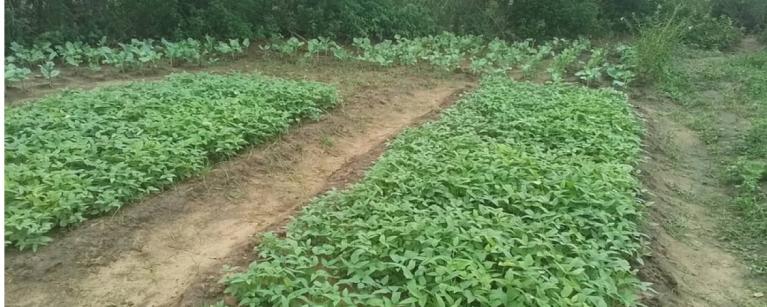“I have acquired skills in vegetable growing,” says Fiona Chelangat
Fiona learned about vegetable growing when she joined an Oxfam project on the topic. The group have a shared demonstration garden, which each person also set up at home. Fiona learned how to grow vegetables and uses organic manure instead of chemicals to manage pests and diseases.
The 26-year-old is a mother of two from a village in Karamoja in north-eastern Uganda. Her family have often struggled to have enough food. The area where they live is prone to long, dry spells and weather that isn’t good for growing crops. Because it was difficult to grow food, Fiona turned to other ways of making money. Some of these were harmful to the environment.
“I was growing cassava, beans, and maize, but due to the bad seasons, I was finding it difficult to feed my family. I resorted to burning charcoal, which was profitable because of its ready market”
New skills
Fiona joined an Oxfam project in November 2023, after her local Parish Chief told her about it. She thought the training topics seemed useful and hoped they would help her to provide food for her family. The topics included vegetable growing, pest and disease control, and beekeeping. She joined one of the groups and was ready to learn.
“I have acquired skills in vegetable growing through land preparation, nursery bed establishment and maintenance, spacing through the straight line and transplanting. The knowledge I got is what I used to establish my own vegetable gardens,” she says.
Savings
As well as learning how to grow crops in the training, the groups were given a variety of vegetable seeds to plant in their own gardens.
“We have our big demonstration garden as a group for the varieties of seeds given by the RISE-K Project. In my garden, I decided to grow cowpeas and okra seeds that did not require a nursery bed.”
Fiona saved money from selling cowpeas she had harvested. She used this to open an extra two-and-a-half acres to plant maize and beans. She hopes to use this space to grow, sell and save more. Fiona and her husband have since stopped tree cutting and charcoal burning, because they harm the environment.
They are confident they will have more food and some extra income from the group and individual gardens. This helps the family with school fees and other costs. Fiona adds that having learned farming as a business, she is planning to open a poultry-keeping project for chickens. She wants to get money from other sources, and supply eggs and chickens to people in the areas surrounding her home. The vegetable growing group she is part of hopes to become the biggest supplier of vegetables in the area.
The RISE-K project
Caritas Moroto Diocese is an Oxfam partner that set up 60 farmer groups in three districts in Karamoja. They teach people how to grow vegetables. This means they have more food and more money to provide for their families. This is part of the Resilience, Inclusiveness, Sustainability, and Empowerment of Communities in Karamoja (RISE-K) project, funded by Irish Aid.
